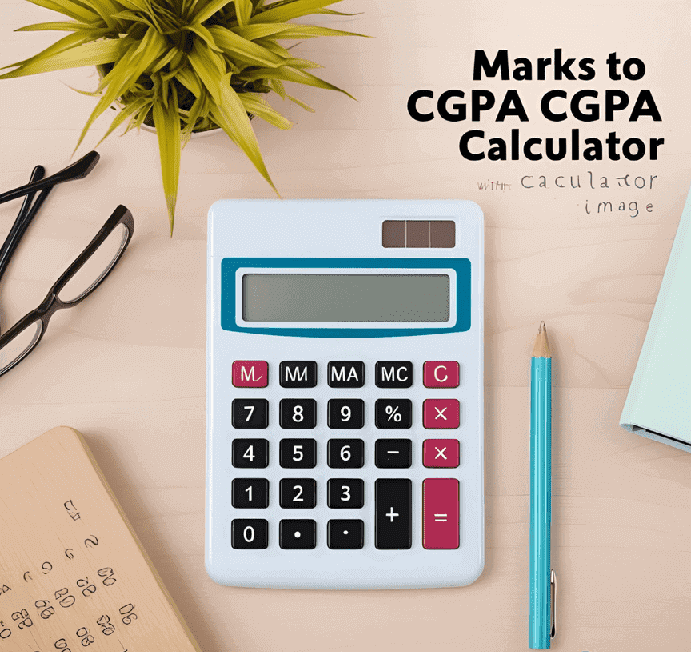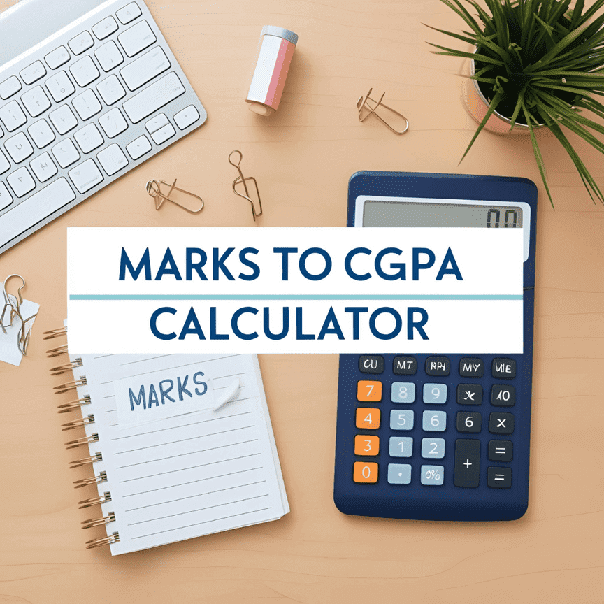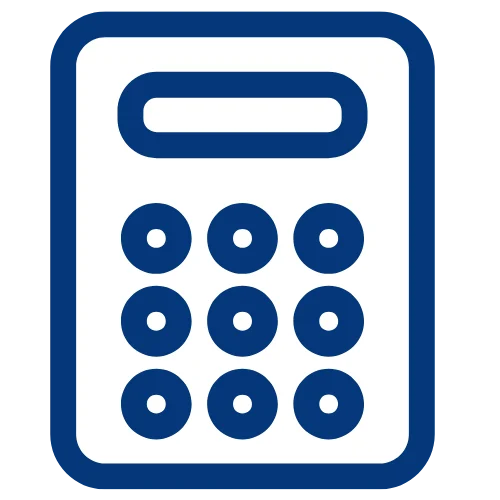Marks to CGPA calculator
Fast and Reliable Online Marks to CGPA Converter Based on Standard Grading Systems
Marks to CGPA Calculator
Convert your percentage marks to CGPA based on different grading scales
Marks to CGPA Convertor
A Marks to CGPA Calculator is a helpful online tool designed to translate your raw marks into a Cumulative Grade Point Average (CGPA).
This is particularly useful in educational systems where individual subject marks or total marks are the primary way of assessment, and a CGPA provides an overall performance indicator, often on a 10-point scale.
This calculator simplifies the process of understanding your aggregate academic achievement in the CGPA format.


How to Use this Calculator?
Enter Your Percentage Marks: Locate the input field labeled “Enter your Percentage Marks”.
Type your total percentage marks obtained in your examination into this field. For example, if you scored 85.5%, enter 85.5. Ensure you enter a valid percentage between 0 and 100.
If you enter a value outside this range, an error message will appear.
Select Your University (Optional): Below the marks input, you’ll find a dropdown menu labeled “University (Optional)”.
Click on this dropdown to see a list of various universities. If your university is listed, select it.
This will apply the specific percentage-to-CGPA conversion formula used by that university.
If your university is not listed, or if you are unsure, you can leave the default selection as “Default (General Formula)”. This will use a common conversion method.
Choose Your Grade Scale: Below the university selection, you’ll see a section labeled “Grade Scale”. There are typically options for different CGPA scales, such as 10.0, 5.0, and 4.0. Click on the scale that is followed by your institution.
The selected scale option will usually be highlighted with a different border color. For example, if your institution uses a 10-point CGPA scale, click on the box with “10.0”.
Click the “Calculate CGPA” Button: Once you have entered your percentage marks (and optionally selected your university and grade scale), click the button labeled “Calculate CGPA”. This button usually has a calculator icon next to the text.
View Your Results: After clicking the “Calculate CGPA” button, a “Your Result” section will appear (if it was hidden initially).
Understanding the Marks to CGPA Calculator
In many educational systems, particularly in India and some other parts of the world, academic performance is primarily assessed through marks obtained in individual subjects or overall total marks in examinations.
For those looking to understand how their marks translate, especially when considering percentage equivalents, institutions often utilize the Cumulative Grade Point Average (CGPA) to offer a consolidated summary of their academic journey.
This is where the Marks to CGPA calculator emerges as a valuable tool, bridging the gap between raw scores and a standardized performance metric, making it easier to convert marks CGPA.
If you’ve ever wondered how to convert marks to CGPA, this article will guide you through the process and the utility of such a tool.
What is a Marks to CGPA Calculator?
A Marks to CGPA calculator online is an online utility designed to convert marks CGPA a student’s raw marks (either in individual subjects or an aggregate total) into a corresponding Cumulative Grade Point Average (CGPA).
It streamlines the often intricate process of converting marks based on specific grading schemes defined by educational boards or institutions.
These calculators typically adhere to the conversion rules and formulas prescribed by the relevant academic authority, answering the fundamental question: what is the formula to convert marks to CGPA?
The necessity for such a tool stems from the fact that while marks are the initial measure of performance, CGPA offers a more holistic and easily comparable metric.
It provides a single numerical representation of a student’s average performance across all subjects and semesters, often on a 10-point scale, making a CGPA converter a handy resource.
Understanding the Utility: Why Use a Marks to CGPA Calculator?
The Marks to CGPA calculator serves several crucial purposes for students:
Clarity on Overall Performance: It translates potentially numerous individual subject marks into a single, easily understandable CGPA, providing a clear picture of overall academic achievement.
Understanding Institutional Standards: Educational institutions often use CGPA as a key criterion for various academic processes, such as promotion to higher classes, eligibility for specific programs, and even placements.
A CGPA converter helps students understand their standing according to these standards.
Tracking Academic Progress: By converting marks obtained in each semester or year, students can track their CGPA over time and monitor their academic progress effectively.
Preparation for Higher Education: Some universities, even within the same country, might prefer or require a CGPA for admissions.
Converting marks beforehand can help students assess their eligibility.
Simplified Comparison: CGPA allows for a more straightforward comparison of academic performance between students within the same institution or board.
Marks to CGPA Examples:
Illustrating the Conversion Process
The conversion of marks to CGPA isn’t a universal formula and heavily depends on the specific grading system adopted by the educational board or institution, making the marks to CGPA conversion formula crucial to understand.
Typically, this involves:
Converting Marks to Grade Points: Each subject’s marks are first converted into a corresponding grade point based on a predefined range, often facilitated by a marks to CGPA calculator with grade points.
For example, a marks range of 91-100 might equate to a grade point of 10, 81-90 to 9, and so on.
Calculating Semester Grade Point Average (SGPA): In a semester system, the SGPA is calculated by taking the weighted average of the grade points obtained in all subjects of that semester.
The weights are usually the number of credits assigned to each subject.
SGPA=Total Credits of the Semester∑(Grade Point of Subject×Credits of Subject)
Calculating Cumulative Grade Point Average (CGPA): The CGPA is then calculated as the weighted average of all the SGPA’s obtained across all completed semesters.
The weights are usually the total credits of each semester.
CGPA=Total Credits of All Semesters∑(SGPA of Semester×Total Credits of Semester)
Simplified Examples (Illustrative, Assuming a Specific Grading Scheme):
Let’s assume a simplified grading scheme where:
91-100 marks = 10 grade points
81-90 marks = 9 grade points
71-80 marks = 8 grade points
61-70 marks = 7 grade points
51-60 marks = 6 grade points
41-50 marks = 5 grade points
0-40 marks = Fail
Example 1 (Single Semester):
A student in a semester with 5 subjects, each carrying 4 credits, scores the following marks:
Subject 1: 85 marks (Grade Point: 9)
Subject 2: 92 marks (Grade Point: 10)
Subject 3: 78 marks (Grade Point: 8)
Subject 4: 65 marks (Grade Point: 7)
Subject 5: 88 marks (Grade Point: 9)
The SGPA would be:
SGPA=4+4+4+4+4(9×4)+(10×4)+(8×4)+(7×4)+(9×4)=2036+40+32+28+36=20172=8.6
In this case, for a single semester, the SGPA is also the current CGPA.
Example 2 (Multiple Semesters):
Let’s say the same student completes another semester with a total of 22 credits and achieves an SGPA of 9.0.
The CGPA after two semesters would be:
CGPA=20+22(8.6×20)+(9.0×22)=42172+198=42370≈8.81
This demonstrates how the CGPA accumulates performance across multiple academic periods.
Key Considerations When Using a Marks to CGPA Calculator:
Accuracy of Input: Ensure you are entering the correct marks for each subject as per your official records.
Understanding the Grading Scheme: Be aware of the specific grading scheme (marks to grade point conversion) used by your institution or board, as this is crucial to accurately calculate CGPA.
For instance, if you are a student of the Uttarakhand board, using a marks to CGPA calculator Uttarakhand board will provide more precise results.
Similarly, for other boards like CBSE (using a marks to CGPA calculator for CBSE) or specific universities (like Delhi University with a marks to CGPA calculator for Delhi University), dedicated calculators are often the best choice.
Credits per Subject: If the calculator requires credits for each subject, input them accurately, as they play a vital role in weighted average calculations.
Total Credits: For calculating CGPA across multiple semesters, the total credits for each semester need to be considered.
Conclusion:
The Marks to CGPA calculator is an indispensable tool for students in educational systems that rely on marks-based assessments.
It simplifies the conversion process, providing a clear and consolidated view of academic performance in the form of a CGPA.
By understanding how these calculators work and the underlying grading schemes, students can effectively track their progress, understand institutional standards, and prepare for future academic endeavors with greater clarity and confidence.
You can often convert my marks to CGPA online free, but always ensure the tool aligns with your specific educational board or institution for the most accurate results.
